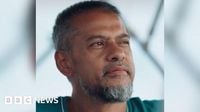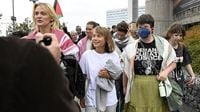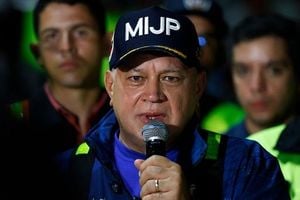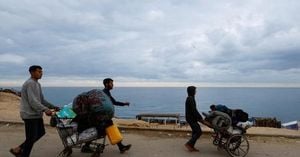On a turbulent stretch of the Mediterranean, a flotilla of activists set out in early October 2025, determined to break Israel’s long-standing blockade of Gaza and deliver aid to a region devastated by two years of war. What followed was a saga of hope, hardship, and controversy—one that has sparked fierce debate across continents and political divides.
The Freedom Flotilla Coalition’s latest mission, dubbed the Global Sumud Flotilla, saw more than 40 boats and hundreds of activists—including high-profile figures like Swedish climate activist Greta Thunberg and Bangladeshi photographer Shahidul Alam—attempt to reach Gaza. Their goal, according to participants, was simple: to show solidarity with Gazans and bring desperately needed supplies. But the events that unfolded at sea, and after their interception by Israeli forces, have become a flashpoint for competing narratives about humanitarianism, activism, and the politics of the Israeli-Palestinian conflict.
On October 8, 2025, Israeli naval forces intercepted the flotilla roughly 100 kilometers off the Gaza coast, in international waters. According to the BBC, Mohammed Ali, a British tutor from Swindon, was among those on board. He and his eight crewmates had spent five weeks at sea, braving storms and uncertainty, before their vessel was forcibly boarded. "I thought the boat might sink," Ali recalled. "Sometimes there was a heavy storm, noises I remember from watching Titanic, you could hear similar sounds of the wood creaking and cracking."
Ali’s account, echoed by other activists, paints a stark picture of what happened next. "We were blindfolded and taken into a police bus. We didn't know where we were going, they were pushing us," he told BBC West. Detained at Israel’s Ktzi'ot Prison—described by the human rights group Adalah as notorious for harsh and abusive conditions—Ali and others say they were packed eight to ten per cell, denied sleep as guards banged on doors and shouted through the night. "They would come and bang on the door, every now and then they would just shout and try to get you up, try to keep you awake," Ali said. He also alleged he was not given his medication for Type 2 Diabetes, despite repeated requests.
Shahidul Alam, the Bangladeshi human rights advocate, offered a similar account at a press conference in Dhaka on October 11. According to Anadolu and other outlets, Alam described psychological abuse and intimidation by Israeli soldiers. "They entered our cells late at night, shouting and pointing guns to create fear," he said. Activists, he reported, were forced to kneel with their hands tied while soldiers hurled insults and desecrated personal belongings. "The most humiliating moment was when they threw my passport to the ground repeatedly." Despite these ordeals, Alam insisted the experience only strengthened their resolve. "Next time, a thousand ships will sail to Gaza," he declared.
Greta Thunberg, detained and flown to Athens after her removal from the flotilla, also alleged mistreatment by Israeli authorities. At a press conference on October 6, she told supporters, "I will never, never be able to comprehend how humans can be so evil," referring to her treatment at the hands of Israelis. Yet, as spiked noted, Thunberg appeared healthy and energetic at the event, raising questions among critics about the extent of the alleged abuse.
The activists’ reception upon returning home was as charged as the events at sea. In Athens, Thunberg was greeted by a raucous crowd, some of whom chanted slogans calling for death to the Israeli Defense Forces (IDF). The mood, as reported by spiked, seemed less focused on humanitarian aid and more on expressing intense loathing for Israel. Other flotilla participants, such as activist Sarah Wilkinson, made incendiary remarks, reportedly dehumanizing Israelis and praising Hamas fighters involved in the October 7 attacks. These extreme views have fueled accusations from Israeli officials and commentators that the flotilla was less about delivering aid and more about staging a political spectacle aimed at delegitimizing Israel.
Indeed, Israeli authorities claimed that none of the flotilla ships were carrying food, water, or medical supplies. Police footage, they said, showed empty holds. Offers from the Vatican and Cyprus to facilitate aid delivery through established humanitarian channels were rejected by flotilla leaders, who described them as a "diversion." To critics, these decisions suggested that the activists were more interested in confrontation than in practical relief for Gazans.
Yet, for many participants, the risks were real and the intentions sincere. Mohammed Ali, for example, said he joined the mission knowing the dangers. "I had said goodbye to my family. At the airport, I was touching everyone, saying: 'Is this for real?' I was quite prepared to face death." His goal, he said, was to "let the people of Gaza know that, as human beings, we're trying everything to reach them."
After several days in custody, most foreign activists were released and deported, thanks to efforts by lawyers, the Turkish government, and diplomatic coordination through Jordan’s King Hussein (Allenby) Bridge. According to the Adalah Legal Center, all participants from the Freedom Flotilla Coalition’s Conscience Mission had been freed by October 12. The final detainees, dual Israeli citizens Huwaida Arraf and Zohar Regev, were released without charges. Activists from countries including Tunisia, Spain, Belgium, France, Germany, Italy, Ireland, Finland, the US, and Canada were among those deported.
Meanwhile, the broader context loomed large. Since October 2023, Israeli military actions in Gaza have killed more than 67,600 Palestinians, most of them women and children, according to Anadolu and other sources. The enclave has been left in ruins, with international calls for accountability growing louder. The first phase of a U.S.-brokered ceasefire agreement took effect on October 10, 2025, under President Donald Trump’s plan to halt the two-year conflict.
As for the activists, their ordeal has only deepened their commitment—at least according to their own statements. Shahidul Alam, for one, issued a rebuke to the international media: "Shame on you, because you are aiding and abetting genocide. Shame on you for not joining this flotilla." He urged journalists to "be on the right side of history" by supporting efforts to end the Gaza blockade.
The flotilla episode has left few neutral observers. Supporters hail the activists as courageous humanitarians, risking their lives to shine a light on Gaza’s suffering. Critics, meanwhile, see the mission as a self-serving exercise in political theater, at times tainted by extremist rhetoric and questionable priorities. The truth, as is often the case in this conflict, may be tangled somewhere in between. What’s clear is that the latest flotilla has reignited global debate over the means and motives of activism, the boundaries of protest, and the ongoing tragedy in Gaza.
As the ceasefire takes hold and activists return home, the world watches to see whether the gestures of solidarity—however fraught—will translate into lasting change for those still trapped behind the blockade.





